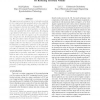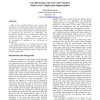21 search results - page 1 / 5 » How Effective are Compression Codes for Reducing Test Data V... |
VTS
2002
IEEE
13 years 9 months ago
2002
IEEE
Run-length codes and their variants have recently been shown to be very effective for compressing system-on-achip (SOC) test data. In this paper, we analyze the Golomb code, the c...
ICCD
2003
IEEE
14 years 1 months ago
2003
IEEE
This paper presents a pinpoint test set relaxation method for test compression that maximally derives the capability of a run-length encoding technique such as Golomb coding or fr...
DATE
2002
IEEE
13 years 9 months ago
2002
IEEE
We present a new test resource partitioning (TRP) technique for reduced pin-count testing of system-on-a-chip (SOC). The proposed technique is based on test data compression and o...
ICCD
2003
IEEE
14 years 1 months ago
2003
IEEE
: Most of the recently discussed and commercially introduced test stimulus data compression techniques are based on low care bit densities found in typical scan test vectors. Data ...
ASPDAC
2007
ACM
13 years 8 months ago
2007
ACM
As the large size of test data volume is becoming one of the major problems in testing System-on-a-Chip (SoC), several compression coding schemes have been proposed. Extended frequ...


